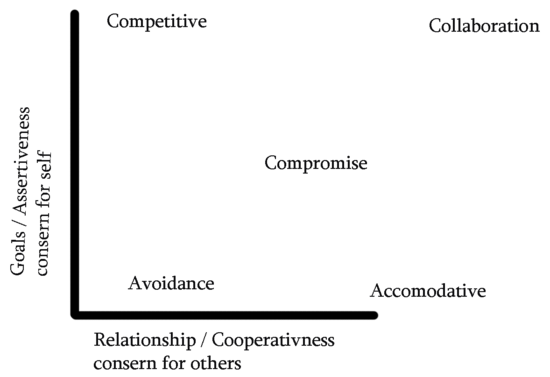Contents
Fight or Competitive
- Strength and power of one person decides the conflict.
A classic win/lose situation. It has its place, but it will create a loser and if that loser has no outlet for expressing their concerns, then it will lead to bad feeling.
Collaboration
- A win/win situation for all.
An often ideal situation. However, it requires input of time from those involved to work through the difficulties, and find a way to solve the problem that is agreeable to all.
Compromise
- Between winning and win-win.
All parties give up something, in favor of an agreed mid-point solution. It takes less time than collaboration, but is likely to lead to less commitment to the solution.
Avoidance
- All try to bypass the conflict between them
Sometimes those in conflict need time to ‘cool down’ before any discussion can be constructive. Or if the conflict is not very important, maybe it will solve over the long course by becoming more irrelevant. Avoidance is chosen when it would cause more problems for all involved to deal with the conflict. But avoidance can create lose/lose situations, since there are still bad feelings - in Transactional Analysis terms: ‘I’m not OK, you’re not OK’.
Accommodative
- On the surface harmony, conflict underneath.
The difference to avoidance is that one person is probably OK with this smoothing, while the other remains in conflict. This option supports win/lose solutions. It is an option, when relationship is more important than dealing with the conflict - but if not all involved agree on this prioritization, it turns into a destructive solution.
Reference
Kory Floyd; Interpersonal Communication: The whole story, 2019
Anna Zakaryan
Expert and facilitator for conflict management, project manager at Creative Armenia.




